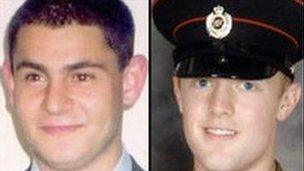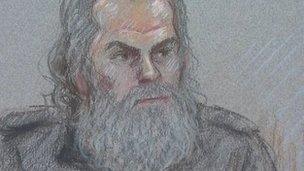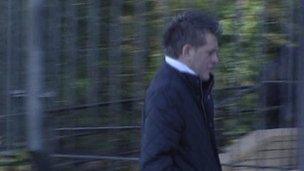Soldiers' murder trial sees CCTV footage of attack
- Published

Patrick Azimkar and Mark Quinsey were murdered in March 2009
The trial of two men accused of murdering two soldiers in 2009 has been shown CCTV footage of the attack.
Patrick Azimkar, 21, from north London and Mark Quinsey, 23, from Birmingham - were shot dead the night before they were due to be deployed to Afghanistan.
They were killed outside the gates of Massereene army barracks as they collected a pizza delivery.
Colin Duffy, 43, from Lurgan, and Brian Shivers, 46, from Magherafelt, both deny any role in the murders.
They also each face seven other charges - six of attempted murder and one of possession of guns and explosives.
The prosecution described the CCTV images as "graphic", and some members of the families of the two soldiers left the court as the footage was shown.
The court saw soldiers in desert fatigues exiting the gates of the barracks shortly before being approached by two gunmen dressed mainly in black, who then opened fire.
'Ruthless'
Wearing balaclavas, the gunmen then walked around two pizza delivery vehicles, apparently looking for soldiers lying on the ground to shoot them again.
Terence Mooney QC said that "chillingly, the gunmen then moved forward to shoot the soldiers on the ground to ensure they were killed".
In all, the killers fired 65 rounds during the attack.
Mr Mooney also outlined how Sapper Azimkar pushed a colleague to the ground before he was shot dead outside the barracks in Antrim.

Colin Duffy is on a no-wash protest while being held on remand
He said that the murder had been carried out by a "ruthless and highly organised" group.
A number of other people were wounded during the attack, including a man delivering pizza to the soldiers.
Mr Mooney said an ad hoc and "rather disorganised" system for delivering food to the barracks had evolved over time.
"This system exposed the soldiers at the main gates for some time," he said.
He added that security at the camp had become relaxed.
The lawyer said soldiers at the base phoned around 20 orders a week to local fast food outlets and, in particular, a pizza delivery shop in the town.
Getaway car
Mr Mooney went on to say that expert analysis had linked images of the getaway car to a vehicle found by police on a quiet country road seven miles from the scene.
He said the green Vauxhall Cavalier had been sold privately by its former owner through an advertisement in a magazine.
The owner told investigators he had cleaned the car and wiped its surfaces prior to putting it up for sale.
When the car was found after the attack it had been damaged by fire.
However, a number of items - including a jar of bullets for an assault rifle - were found in the car and near where it was abandoned at the junction of the Derrygowan and Ranaghan roads.

Brian Shivers going into the court on Monday morning
Mr Mooney said DNA testing linked Mr Duffy to a latex glove tip found on the floor.
He also said DNA tests linked Mr Shivers to a matchstick and a mobile phone.
The defence objected to the prosecution presentation of the evidence against Mr Duffy.
Mr Mooney said that on the basis of the evidence, it was not suggested that Mr Duffy was one of the gunmen.
He said the evidence set the accused in the position of being part of a joint enterprise that led to the killing of the two soldiers.
Mr Mooney later played an audio clip of a voice message said to have been accidentally left on a mobile phone found in the car.
"The message is chilling and self-explanatory," he told the judge.
The court then heard an audio clip of a male voice saying: "There were a few dead all right."
At the start of the trial, the court was told witnesses may be called from the United States and New Zealand.
The trial is expected to last five weeks.